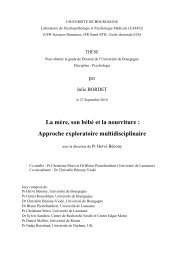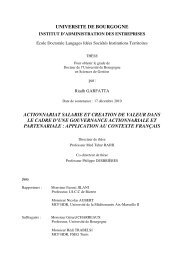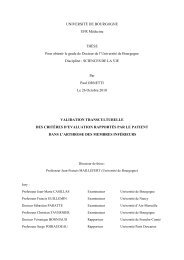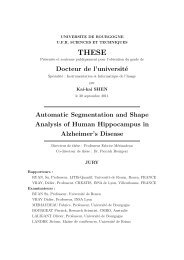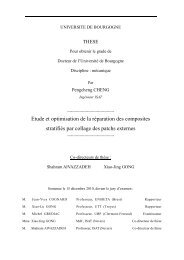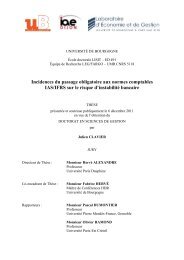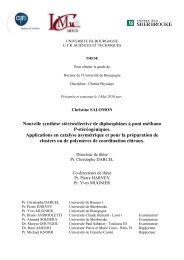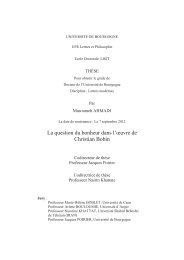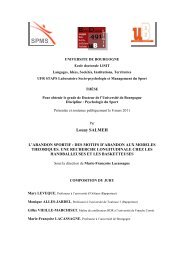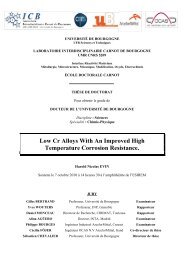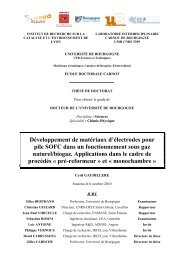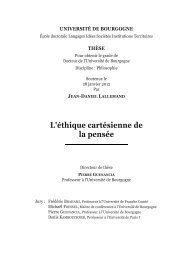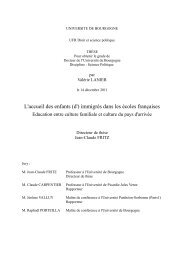UNIVERSITE DE BOURGOGNE THÈSE Yongbo LIU - Université de ...
UNIVERSITE DE BOURGOGNE THÈSE Yongbo LIU - Université de ...
UNIVERSITE DE BOURGOGNE THÈSE Yongbo LIU - Université de ...
Create successful ePaper yourself
Turn your PDF publications into a flip-book with our unique Google optimized e-Paper software.
Abstract<br />
In the framework of commercial release for transgenic crops with novel traits, consequences of gene<br />
flow and introgression are still one main concern. I explored the ecological and evolutionary<br />
consequences of gene flow between oilseed rape (Brassica napus) and its wild relatives, brown<br />
mustard (B. juncea) and wild radish (Raphanus raphanistrum), through several experiments carried<br />
out in greenhouse, common gar<strong>de</strong>n and field in Beijing and Dijon.<br />
First, I revised a comprehensive review of the literature about gene flow and its effect on<br />
plant fitness in the Brassiceae. Second, I investigated the effects on gene flow of seed size of hybrids<br />
between Bt-transgenic oilseed rape and mustard. Small seed size significantly reduced plant growth<br />
and reproduction, but its influence on plant fitness varied among genetic backgrounds. Backcrosses<br />
to oilseed rape were easier and more productive than other types of progeny of hybrids. Most of<br />
these plants exhibited oilseed rape morphology. Together with herbici<strong>de</strong>-resistance, this trait could<br />
help the progeny to survive in the field and disseminate the transgene to volunteers and feral<br />
populations, which could be more troublesome than completing introgression into the genome of<br />
the wild parent species. Third, I simulated herbivory on mustard to study the competition between<br />
insect-resistant and susceptible plants in<strong>de</strong>pen<strong>de</strong>ntly to the fitness of the interspecific hybrid.<br />
Resistant plants held a competitive advantage un<strong>de</strong>r herbivory pressure, and this advantage was<br />
magnified in harsh conditions, such as low resources and high simulated herbivory pressure. The use<br />
of insects to attack mixed populations composed of transgenic Bt-resistant and susceptible<br />
backcrosses confirmed the same conclusion and provi<strong>de</strong>d evi<strong>de</strong>nce of no cost due to the transgene<br />
in the absence of insect. The overall population production increased with the increasing proportion<br />
of insect-resistant plants in the presence of insects. Fourth, wild radish populations were sampled<br />
from four geographically distant regions, of which one region had a long history of oilseed rape<br />
cultivation, and, therefore, higher chance to have been submitted to interspecific hybridization with<br />
the crop. Traits divergence and polymorphism in the putative introgressed populations could be<br />
supported as alternate hypothesis to random variation, although the differences were not marked<br />
enough to place these populations out of the range of variation <strong>de</strong>scribed in wild radish.<br />
These studies pointed out different factors that could enhance the risk of transgenic flow and<br />
introgression from transgenic crops to wild relatives, and they must be taken into account in the risk<br />
assessment of the use of GM crops: crop traits to i<strong>de</strong>ntify the hybrid progeny and perform<br />
monitoring, small seed size to account for seed dispersal and dormancy, and intensity of herbivory<br />
and competition that magnify the fitness advantage of insect-resistant transgenic plants. However,<br />
the impact of introgression to create super-weeds was not supported.<br />
Key words: oilseed rape (Brassica napus), wild mustard (Brassica juncea), wild radish (Raphanus<br />
raphanistrum), competition, fitness, genetically modified (GM), gene flow, introgression,<br />
morphological traits, population dynamics, seed production, transgene<br />
2



